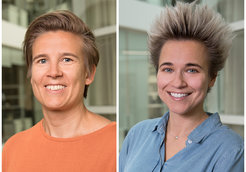European funding for Wickström lab
Support by ERC grant and Embo fellowship
The lab of Sara Wickström at the Max Planck Institute for Biology of Ageing has good reason to celebrate: Max Planck Research Group leader Sara Wickström received the ERC Consolidator Grant and Yekaterina Miroshnikova, Postdoc in the lab, was selected for an EMBO fellowship. The European funding will support the Wickström group in their studies of skin homeostasis in ageing.

Our skin protects us from pathogens and our body from dehydration. To do this, it must constantly renew itself and produce new skin cells. The skin’s stem cells play a central role in this process - they provide the necessary supply of new cells. But the skin has changing needs, from wound healing to sensation of temperature, and needs to adapt to each state. “The adult stem cells in the skin function in a dynamic and flexible way. The cells can adjust to different situations and even differentiated cells can under certain circumstances go back to a stem cell state to ensure tissue maintenance and repair”, explains Sara Wickström.
ERC Consolidator Grant to study cell fate in the skin
The ERC Consolidator Grant allows Wickström to focus her research on how this flexibility of the stem cells is controlled. The prestigious grant from the European Research Council provides a funding of 2 Million Euros for five years. In her project she wants to understand which genetic and epigenetic “barriers” prevent cells from reverting into stem cell status. Additionally the group will perform a drug screen to identify compounds that boost stem cell behaviour in the skin to facilitate the development of regenerative therapies for skin diseases. “There could not have been a better timing for this grant. Having five years of secure funding for this project is just a really good feeling”, says Wickström.
Wickström will also benefit from the grant to start her new lab at the University of Helsinki, which she is setting up since January 2018 at the Helsinki Institute of Life Science (HiLIFE) in parallel to her continuous work at the Max Planck Institute for Biology of Ageing in Cologne.
Additional funding through EMBO fellowship
Yekaterina Miroshnikova, Postdoc in the group of Sara Wickström was successful with her application for an EMBO fellowship. It is awarded to her for a period of two years. “I am very happy about the fellowship, because it is a great support for my scientific career”, says Miroshnikova. Her research focuses on studying how mechanical forces influence nuclear and genome structure. “Gene activity is also dependent on its location inside the cellular nucleus. External mechanical signals acting on the nucleus could alter this positioning and thereby influence gene expression and even cause DNA damage”, explains Miroshnikova. She will study how this spatial regulation of gene expression is controlled and how the genome can be protected from external forces.
About the awardees
Sara Wickström studied and graduated at the University of Helsinki in Finland. Then she joined the Max Planck Institute for Biochemistry in Munich. In 2010, she started her Paul Gerson Unna Research Group at the Max Planck Institute for Biology of Ageing. The Wickström group is supported by the Max Planck Foundation. Since January 2018 she started in parallel a new lab at the University of Helsinki. Yekaterina Miroshnikova joined the Wickström lab as a Postdoc in 2016 after performing her PhD at Berkley/University of California San Francisco (USCF).
Read more about the work in Sara Wickström's group.








